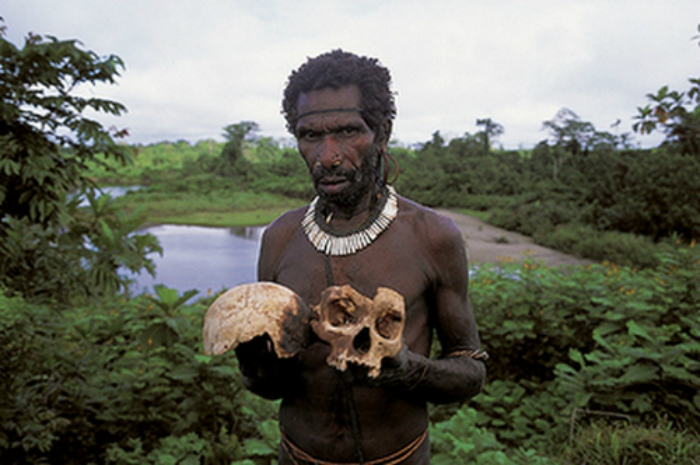Have you ever been so hungry you felt you could “literally eat anything right now?!”
For the Fore tribe in Papua new Guinea, though, flesh-eating is a longstanding tradition, called “mortuary feasts”. This involves eating the dead from their community at funerals as a sign of respect for their lost loved ones. Odd to us perhaps, and while cannibalism is not a common universal practice, it still persists – and not as far away as you’d think!
Recently, right here at home, a human arm and leg were found at a traditional healer’s home after a man turned himself in at a local police station, confessing to be “tired of eating human flesh”.
On the heels of this, hundreds of other people came forward to reveal they'd knowingly been eating human flesh. So, in fact, cannibalism is not an outdated practice. It seems, in the year 2017, this macabre ritual is still prevalent
Human skulls as jewellery
Eating of human flesh by another human being is called cannibalism. Various groups around the world have practised cannibalism for many reasons. Some claim to gain “strength and power” from eating certain body parts.
Eating of human flesh and brains sparked controversy after Reza Alan, an American author and academic featured the Aghori tribe from India on his series. The Aghori are notorious for uncommon and grisly rituals that involve eating human flesh, faeces and engaging in taboo sexual practises.
The Aghori don’t kill humans, however, but rather feed off corpses they find in the sea. They also cover their bodies with the ashes of cremated corpses to ward off diseases; and wear “jewellery” in the form of a human skull around their necks. There are non-cannibalistic Aghori people too. Different strokes, for different folks, right?
A dangerous disease
Humans are multifaceted interesting beings, but we’re not really that great in terms of nutritional value! Cannibalism almost died out in recent years, linked to “kuru”, a fatal and rare neurodegenerative disorder. Think of the mad cow disease but in human form, which is known as Creutzfeldt-Jakob disease.
One of the causes of this disease is believed to be eating beef products contaminated with the central nervous system tissue, the brain and spinal cord, and from cattle infected with mad cow disease. There’s no effective treatment to cure Creutzfeldt-Jakob disease. In fact, in the 20th century, the disease almost wiped out the cannibals in Papua New Guinea.
It’s a dangerous disease that once it takes hold, leads to a speedy deterioration of your health. Researchers in the 1950s found that the Papua New Guinea tribe had trouble walking, lost control over their limbs and even their emotions and mental state. Within a year, they were almost completely immobile.
It’s a rapid mental destruction which includes:
Memory loss
Depression
Problems concentrating
Impaired thinking
Insomnia
Numbness
Difficulty speaking and swallowing
Anxiety
Personality changes
Hallucination
Overactive reflexes
Jerky muscle spasms
Human flesh is ultimately not something you want to sink your teeth into. In the spirit of Halloween and Hannibal Lecter, rather watch a horror movie! It’s infinitely safer.
Fuente: www.health24.com
